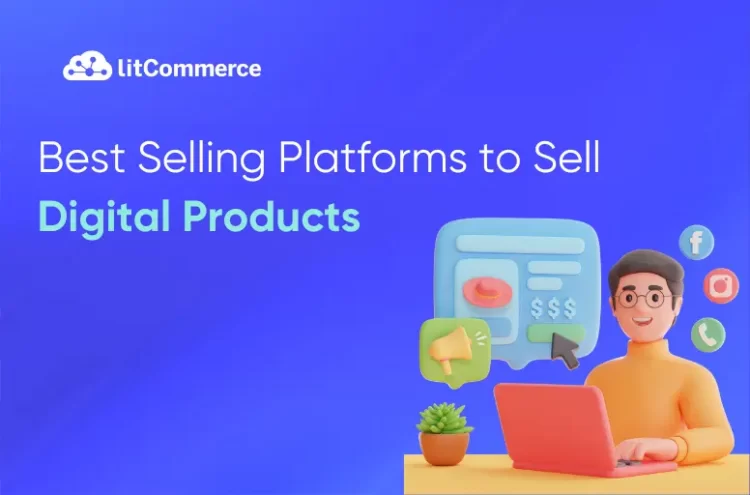Selling digital products opens endless possibilities for creators, but choosing the right platform is key to unlocking success. With so many options available, how do you pick the one that fits your needs? To make it easier, we’ve handpicked the best platforms to sell digital products, each designed to boost your sales and streamline your process, including:
- Etsy
- Creative Market
- Payhip
- Thinkific
- Sellfy
- Shopify
- Udemy
- Podia
- Teachable
- Gumroad
- RedBubble
- Envato
Dive in and discover the perfect platform for your digital journey!
What is a Digital Product?
A digital product is any item or service that can be delivered electronically without physical components. Examples of digital products include eBooks, music, software, online courses, stock photos, and templates. Unlike physical products, digital products are convenient because they can be delivered immediately after purchase and do not require shipping or inventory.
Selling digital products has become increasingly popular due to low production costs and the ability to scale sales easily. Once created, a digital product can be sold repeatedly without additional expenses. Many creators, such as authors, musicians, or graphic designers, find it an effective way to monetize their skills online.
12+ Best Platforms to Sell Digital Products
Here are 12+ of the best platforms to sell digital products, each with its own unique strengths and weaknesses.
#1. Etsy
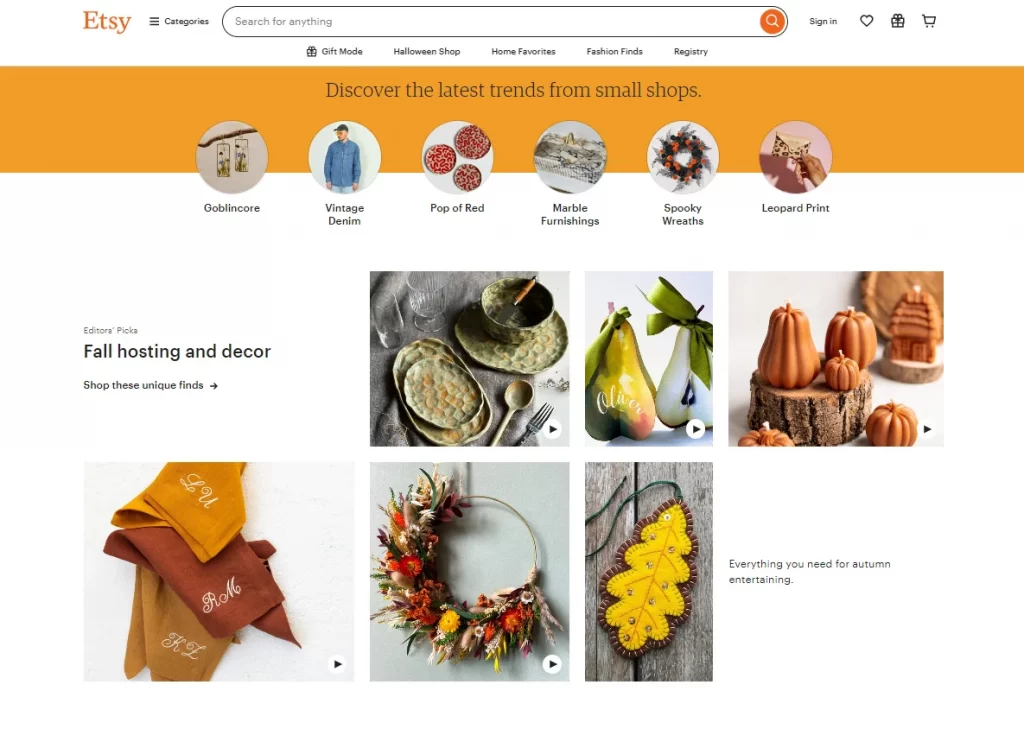
Established in 2005, Etsy is a top marketplace for selling products, especially handmade and vintage goods. It boasts over 96 million active buyers and 7.5 million active sellers. While primarily known for physical products, it has expanded to include digital downloads, offering creators an opportunity to tap into its vast customer base. Etsy’s strength lies in its focus on unique and creative items, aligning well with the growing demand for personalized digital products. It’s one of the best platforms to sell digital products if you’re targeting a crafty and artistic audience.
Strengths:
- Large customer base with global reach.
- Easy-to-use platform for beginners.
- Low listing fees, making it one of the best platforms to sell digital products.
- Search engine visibility within Etsy helps increase exposure.
Weaknesses:
- High competition, especially for popular categories.
- Limited branding control compared to standalone websites.
- Additional advertising costs may be required for more visibility.
Etsy is suitable for:
- Artists and crafters
- Vintage sellers
- Hobbyists
On Etsy, it would be better to sell:
- Printables (Printable art, planners, wall art, greeting cards, and invitations)
- Patterns and templates (Sewing patterns, knitting patterns, crochet patterns, graphic design templates, and resume templates)
- Digital graphics (Clip art, illustrations, fonts, and digital stickers)
- Vintage-inspired designs (Digital designs inspired by vintage aesthetics, such as retro fonts or antique-style illustrations)
Price to sell on digital product on Etsy include:
- Listing fee: $0.20 per listing (renewed every 4 months)
- Transaction fee: 6.5% of the total sale price (including shipping costs)
- Payment processing fee: Varies depending on the payment processor used
#2. Creative Market
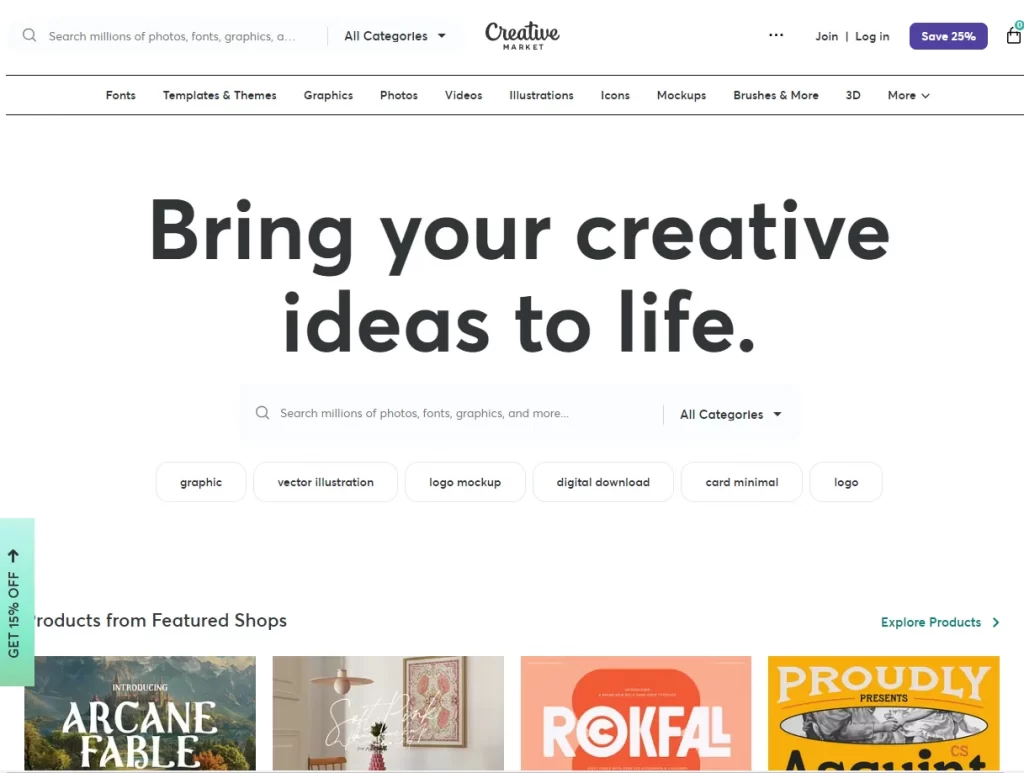
Launched in 2012, Creative Market is a curated marketplace for high-quality design assets, connecting independent creators with a discerning audience. It has attracted over 6 million members, including both sellers and buyers. The platform’s emphasis on quality and its engaged community of designers sets it apart as one of the best platforms to sell digital products in the creative industry.
Strengths:
- Targeted customer base for design-related digital products.
- High commission rate (up to 70%) for sellers.
- Established reputation as a premium digital design marketplace.
- Curated product listings help maintain quality.
Weaknesses:
- Approval process for new sellers can be stringent.
- High competition from well-known creators.
- Limited flexibility in pricing and product presentation.
- Revenue sharing model may reduce profit margins.
This best website to sell digital products is perfect for those who want to sell premium assets, such as:
- Professional graphic designers
- Illustrators
- Web Designers
- Photographers
And here are some types of digital products should be sold on Creative Market:
- Fonts
- Graphics: Graphics packs, illustrations, icons, and other graphic elements are in demand.
- Templates (Website templates, social media templates, presentation templates, etc)
- Photos (Stock photos, textures, and other photography-related products)
- Add-ons (For design software like Adobe Photoshop and Illustrator)
In terms of price, Creative Market charges a 40% transaction fee on each sale, with no upfront or monthly fees. It’s one of the best platforms to sell digital products for design professionals.
#3. Payhip
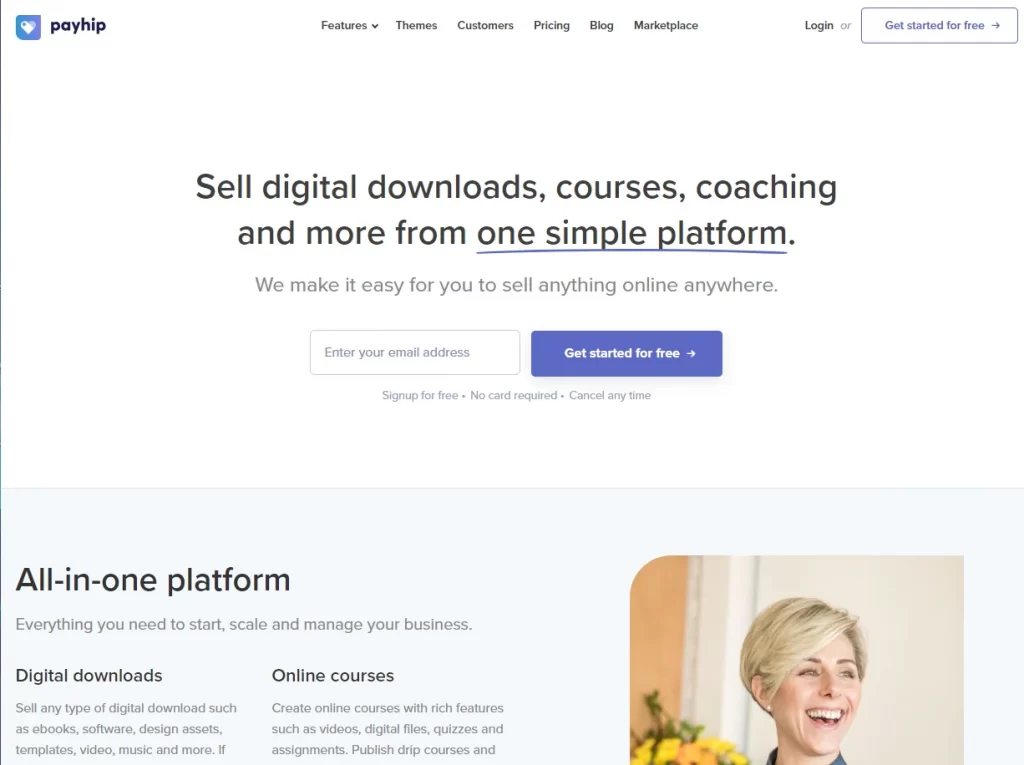
Payhip, launched in 2011, offers an all-in-one platform for selling digital products and physical goods. It has over 130,000 sellers and is praised for its simple, user-friendly interface and affiliate marketing tools.
Strengths:
- No upfront fees; only pay when you make a sale.
- Customizable storefront without needing a separate website.
- No limit on the types of digital products you can sell.
- Integrated tools for marketing, including affiliate programs.
Weaknesses:
- Limited customization options compared to larger platforms.
- May require more self-promotion due to lack of a built-in audience.
- Limited third-party integrations for advanced users.
- Transaction fees on the free plan.
This digital products marketplace is great for:
- Independent creators
- Course creators
- Digital product sellers
Payhip is where to sell digital downloads like:
- Ebooks
- Online courses (thanks to membership features of Payhip)
- Software (Payhip supports the sale of software downloads and license keys)
- Music
- Other digital downloads (such as printables, templates, and graphics)
Price on sell digital downloads on Payhip include:
- Free Plan: 5% transaction fee
- Plus Plan: $29/month, no transaction fees
- Pro Plan: $99/month, no transaction fees
#4. Thinkific
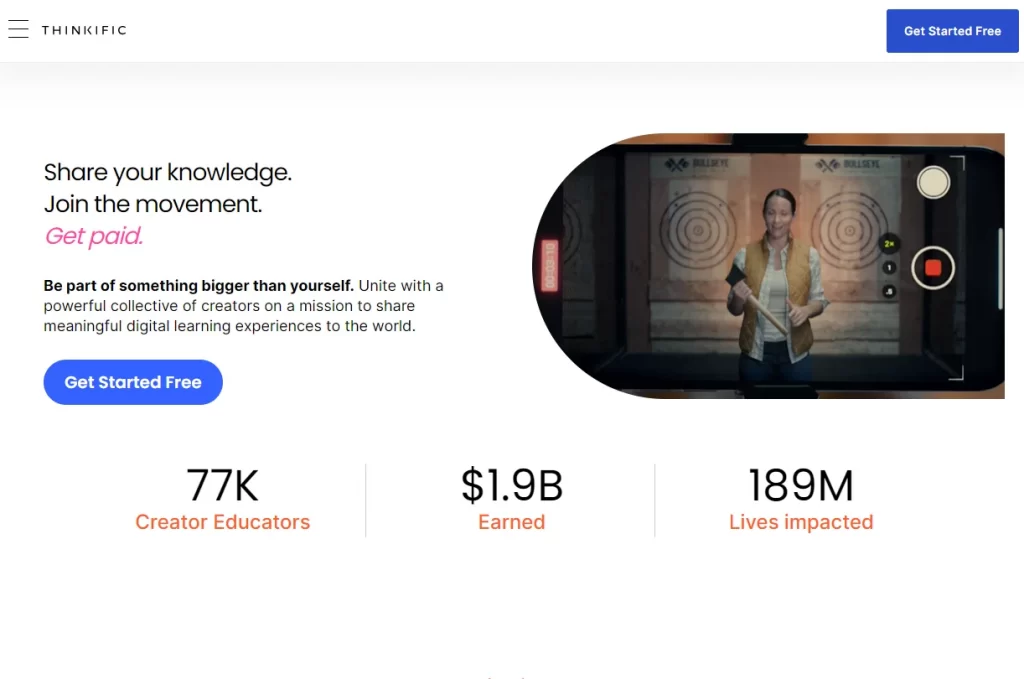
Since its launch in 2012, Thinkific has become one of the top platforms for selling online courses. With over 77,000 course creators and 30 million students worldwide, it offers extensive tools for creating and managing educational content. Thinkific is known as one of the best platforms to sell digital products, especially in the education space
Strengths:
- Advanced course creation tools, including video hosting and quizzes.
- Customizable course player and landing pages.
- No transaction fees on paid plans.
- Built-in tools for marketing and student engagement.
Weaknesses:
- Limited flexibility for selling non-course digital products.
- Higher price plans can be expensive for new creators.
- May require technical knowledge to fully customize the site.
- Free plan limitations, such as a cap on the number of students.
As referenced in the previous section, Thinkific is the best fit for educators. However, there are also a number of other niches that are well suited to selling digital products on this platform, such as:
- Coaches and consultants
- Businesses and organizations (create employee training programs or offer online courses to customers)
- Entrepreneurs and solopreneurs (Individuals with specialized knowledge or skills )
Here are some types of digital products to sell on Thinkific:
- Online courses
- Membership sites
- Training material
- Workshops and webinars
The prices to sell on Thinkific are various, including:
- Free plan: Thinkific can be the best platform where to sell digital products for free. However, the free plan includes limited features and incurs transaction fees
- Basic plan: $49/month; transaction fees apply
- Pro plan: $99/month, no transaction fees
- Premier plan: $499/month, no transaction fees
#5. Sellfy
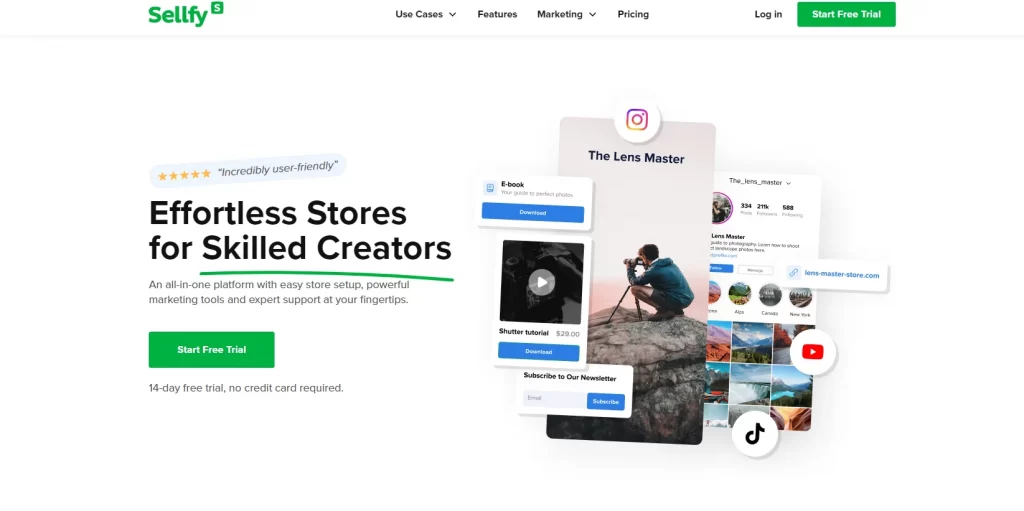
Sellfy, founded in 2011, is a versatile platform that enables creators to sell both digital products and physical items. It has over 300,000 sellers worldwide and supports a wide range of products, including eBooks, videos, and digital art.
Strengths:
- All-in-one solution for selling digital and physical products.
- Easy-to-use interface with minimal setup required.
- Customizable storefront without needing a separate website.
- Built-in marketing tools, including email marketing and discounts.
Weaknesses:
- Limited customization options compared to larger platforms.
- Higher transaction fees for the basic plan.
- Not ideal for large-scale sellers due to fewer advanced features.
- Limited integrations for advanced eCommerce tools.
Sellfy is one of the best platforms to sell digital products for those who are looking for a quick and easy setup, such as:
- Small business
- Independent creators (artists, musicians, and entrepreneurs)
- Content creators (Bloggers, vloggers, and podcasters)
- Educators and trainers
Some types of digital products you can sell on Sellfy are:
- Ebooks and PDFs
- Software and applications
- Music and audio files
- Videos and online courses
- Graphic design asset
To sell on Sellfy, you need to pay for one of the following plans:
- Starter plan: $29/month, 5% transaction fee
- Business plan: $59/month, 0% transaction fee
- Premium plan: $129/month, 0% transaction fee
#6. Shopify

Established in 2006, Shopify is a top e-commerce platform that enables businesses to create and manage online stores. While not exclusively for digital products, its extensive features and scalability make it a popular choice for sellers of all kinds. Now, Shopify serves over 1.75 million merchants globally.
Strengths:
- Highly customizable storefront with numerous templates.
- Access to a large variety of third-party apps for advanced functionality.
- Integrated payment processing, including credit cards and PayPal.
- Built-in marketing tools for SEO, email campaigns, and discounts.
Weaknesses:
- Monthly fees can be higher compared to other platforms.
- Requires some technical knowledge for advanced customization.
- Additional costs for third-party apps and themes.
- Not specifically geared toward digital downloads, requiring extra setup for digital products.
Shopify is suitable for:
- Entrepreneurs launching new digital product lines
- Creatives such as artists, musicians, and authors looking to sell their work
- Educators offering online courses or educational materials
- Businesses aiming to expand their product offerings into the digital realm
Recommended the digital products to sell on Shopify include:
- E-books
- Online courses
- Music and audio files
- Graphic design assets
- Software and applications
- Digital templates (e.g., resumes, presentations)
In terms of cost, Shopify offers a variety of plans to choose from, such as:
- Basic Plan: $29/month
- Shopify Plan: $79/month
- Advanced Plan: $299/month
- Shopify Plus: Starting at $2,000/month for enterprise solutions
Additionally, transaction fees apply depending on the payment gateway used (typically ranging from 2.9% + 30¢ per transaction on the Basic plan). This fee structure should be considered when calculating profit margins on digital sales.
#7. Udemy
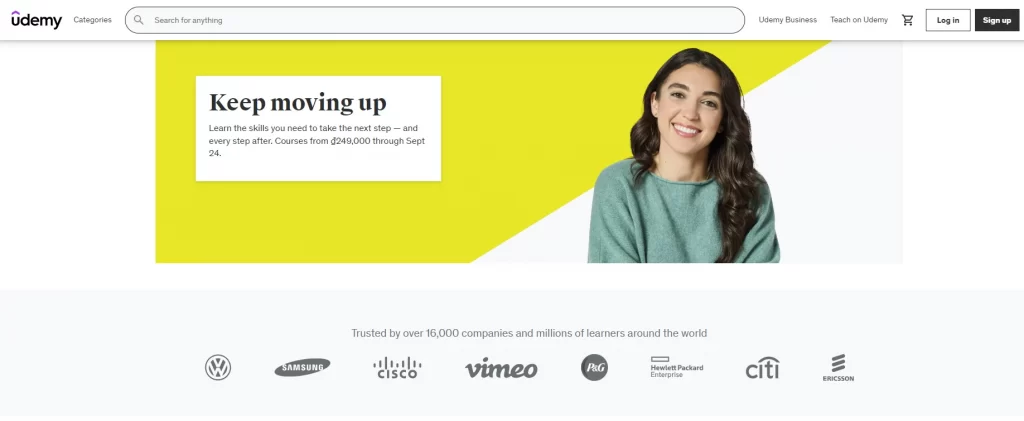
Founded in 2010, Udemy is a globally recognized platform for selling and hosting online courses, with over 57 million students and 70,000 instructors. Udemy’s massive user base and easy-to-use tools make it one of the best platforms to sell digital products, especially for educators.
Strengths:
- Global audience with over 40 million students.
- Easy-to-use platform for creating and uploading courses.
- No upfront fees for course creation.
- Promotion tools help increase visibility within Udemy’s marketplace.
Weaknesses:
- Revenue sharing model takes a significant portion of sales (up to 50%).
- Limited branding control, as all courses are hosted on Udemy’s platform.
- High competition, especially in popular course categories.
- Low course prices during promotions can reduce earnings.
Seller groups that would benefit from using Udemy as the best platform to sell digital products include:
- Subject matter experts
- Educators and trainer
- Entrepreneurs and freelancers (Those with specialized skills can create and sell courses on Udemy to generate additional income.)
- Businesses and Organization (Utilize Udemy to train employees or offer courses to customers)
So, what can you sell on Udemy? Here’s the answer:
- Online courses
- Video tutorials
- Supplementary materials
In terms of pricing plans for sellers, Udemy operates on a revenue-sharing model, taking 50% of course sales when sold through their marketplace.
#8. Podia
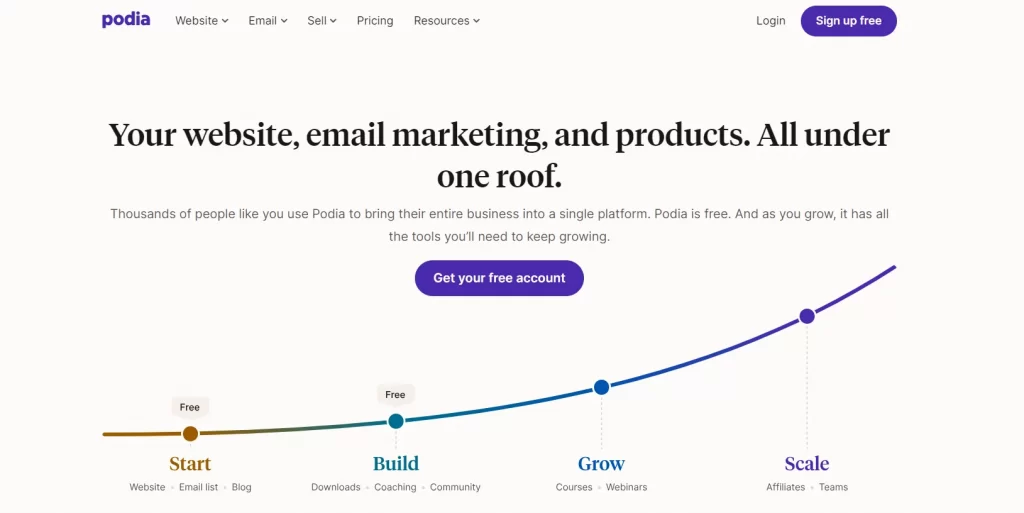
Podia, established in 2014, focuses on helping creators sell digital products such as online courses, memberships, and downloads. With over 100,000 creators, Podia is praised for its all-in-one solution for digital sales and marketing, allowing sellers to host products, manage email lists, and create memberships.
Strengths:
- All-in-one platform for digital products, courses, and memberships.
- No transaction fees, even on the basic plan.
- Simple to set up and manage, making it great for beginners.
- Built-in email marketing tools to engage your audience.
Weaknesses:
- Limited customization options compared to other platforms.
- No advanced features for large-scale sellers.
- Higher monthly fees if you need advanced features.
- No free plan, which can be a barrier for creators on a budget.
Podia is a good option for beginners looking for where to sell digital downloads without the hassle of managing multiple tools. These beginners can be:
- Coaches, consultants, and entrepreneurs
- Course creators
- Membership site owners
On Podia, you can sell:
- Online courses
- Memberships
- Digital downloads
- Webinars
About price, Podia offers two plans:
- Mover plan: $39/month
- Shaker plan: $79/month
#9. Teachable
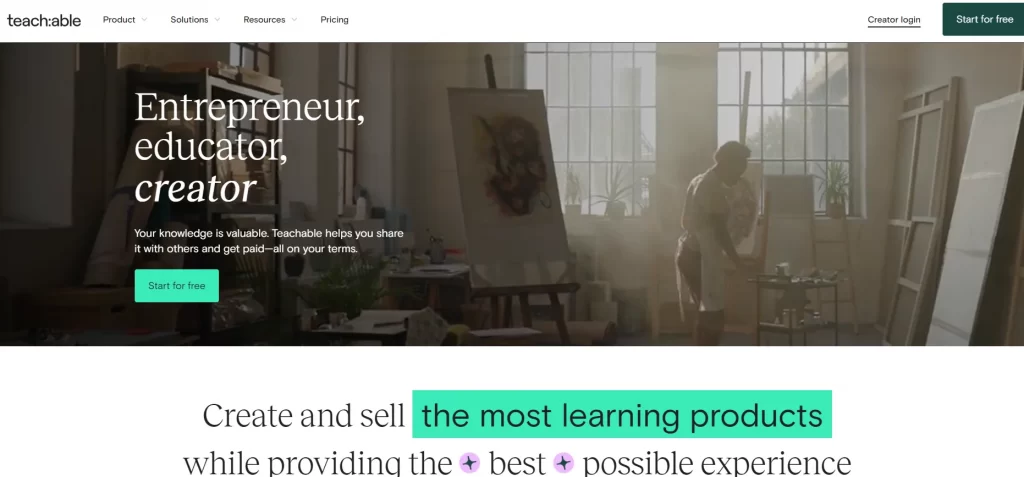
Launched in 2014, Teachable is an online platform specifically designed to sell courses and coaching services. As one of the best platforms to sell digital products, it serves over 100,000 instructors and has helped generate over $1 billion in course sales.
Strengths:
- Easy course creation tools with video hosting, quizzes, and certificates.
- Integrated payment processing, including options for global sales.
- Customizable course pages and sales funnels.
- No transaction fees on paid plans.
Weaknesses:
- Limited flexibility for selling non-course products.
- Higher monthly fees for advanced features.
- Free plan limitations, including transaction fees and limited students.
- Requires self-promotion to attract students.
Sellers who should consider using Teachable for digital product sales include:
- Educators and trainers
- Coaches and consultants
- Businesses and organization
And here’s a list of the best digital products to offer on this platform
- Online courses of all types and lengths.
- Workshops and webinars
- Online coaching programs and mentorship initiatives.
To sell on Teachable, you’ll need to choose from one of the following three plans:
- Basic Plan: $39/month + 5% transaction fees
- Pro Plan: $119/month, no transaction fees
- Business Plan: $299/month, no transaction fees
#10. Gumroad
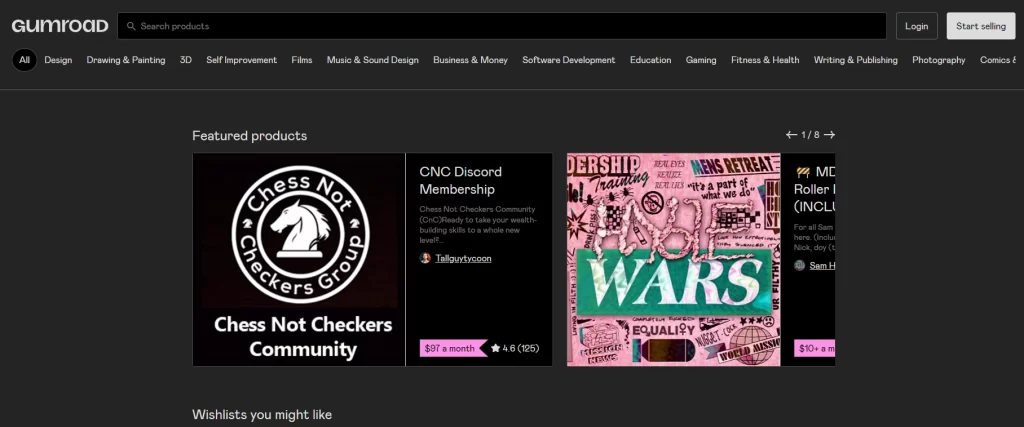
Launched in 2011, Gumroad is a platform that empowers creators to sell digital products directly to their audience. Its simplicity and focus on direct sales make it an attractive option for those seeking a hassle-free selling experience. This is the best website to sell digital products, and it has over 70,000 creators and millions of users.
Strengths:
- No upfront costs; only pay when you make a sale.
- Simple setup and easy-to-use interface.
- Supports a wide range of digital products, including software, eBooks, and memberships.
- Integrated tools for marketing and promotions.
Weaknesses:
- Transaction fees can be high on the free plan.
- Limited customization options for your storefront.
- Not suitable for large-scale businesses.
- No built-in audience, so promotion is needed.
Gumroad is ideal for:
- Creators, artists, musicians, writers
- Bloggers, vloggers, podcasters, and other content creators
- Small businesses looking to sell digital products without the complexities of a full-fledged e-commerce platform.
On Gumroad, some of the popular digital items to sell include:
- Ebooks, guides, reports, and other PDF documents.
- Software downloads and license keys
- Music and audio files
- Video tutorials, online courses, and other video-based content.
- Graphics, templates, fonts, stock photo
Gumroad is an excellent platform where to sell digital products for free, offering a free plan with a 10% transaction fee. Additionally, it provides a Creator plan for $10/month with a reduced 5% transaction fee.
#11. RedBubble
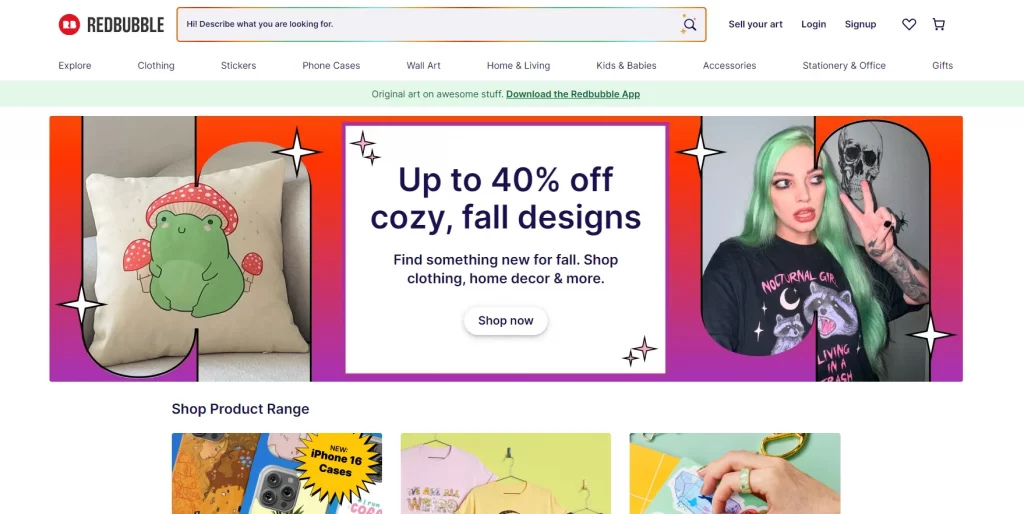
Since its launch in 2006, RedBubble has become a well-known marketplace for artists looking to sell their digital products like art prints and designs on physical goods. With over 700,000 creators and millions of users, RedBubble allows artists to upload designs that can be printed on a variety of products. As one of the best platforms to sell digital products, RedBubble stands out for its print-on-demand service. This allows creators to earn passive income without worrying about inventory.
Strengths:
- No upfront costs; only pay when a sale is made.
- Global customer base, which increases your potential reach.
- RedBubble handles all production and shipping for your products.
- No need for inventory management.
Weaknesses:
- Lower profit margins compared to selling directly.
- Limited customization of product options.
- You have no control over pricing, as RedBubble sets base prices.
- High competition from other artists and designers.
You should sell on RedBubble if you are:
- Graphic designers and illustrators
- Artists and photographers
- Pattern designers
- Hobbyists
RedBubble’s top-selling items include:
- Digital art prints
- Graphic design assets
- Phone wallpapers
Regarding the price of RedBubble, there are some points you should remember:
- No listing fees: RedBubble does not charge listing fees.
- Commission-based pricing: Creators set their own markup on top of RedBubble’s base prices, earning a commission on each sale.
- Payout threshold: Creators must reach a minimum payout threshold before receiving their earnings.
#12. Envato
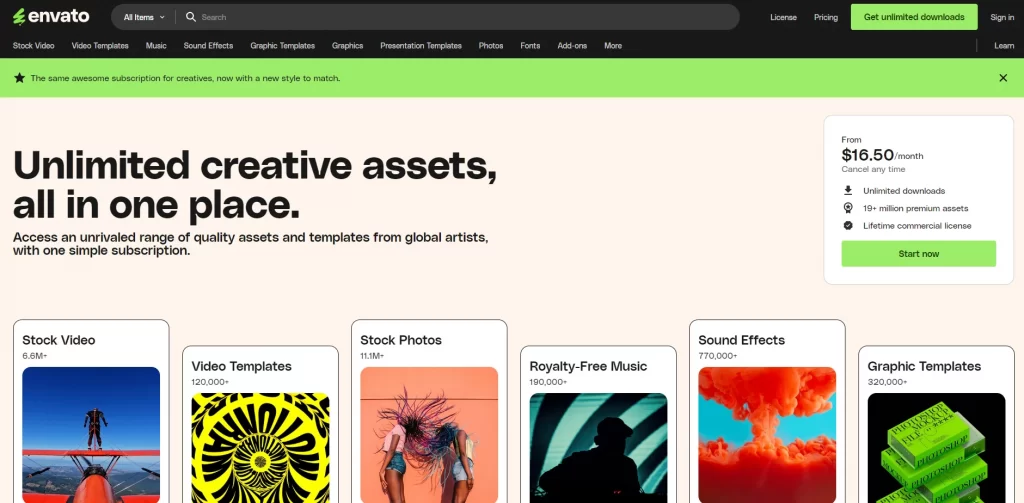
Established in 2006, Envato is a leading digital marketplace with over 2 million active buyers and 67,000 sellers. It specializes in selling creative assets like themes, video templates, and plugins. Envato has paid out more than $1 billion to its creators.
Strengths:
- Large customer base with millions of buyers worldwide.
- Curated marketplace for high-quality creative products.
- Supports a wide range of digital downloads, including themes, graphics, and stock videos.
- Revenue sharing with high commission rates.
Weaknesses:
- Approval process for new sellers is strict.
- High competition from established creators.
- Revenue sharing model reduces overall profit margins.
- Requires high-quality products to stand out.
You may find it more beneficial to sell on Envato if you are:
- Professional designers
- Developer
- Photographers and videographers
- Musicians and sound designers
Some of the most in-demand products to sell on Envato include:
- Website templates and themes
- Code scripts and plugins
- Stock photos and videos
- Music and sound effects
- Graphic design assets
As for pricing, Envato is free to join, but you should be mindful of:
- Commission fees: Envato’s commission fees vary depending on the marketplace and the creator’s exclusivity status. They typically range from 30% to 50% for non-exclusive items and can be lower for exclusive items.
- Payout threshold: Creators must reach a minimum payout threshold before receiving their earnings.
Best Platforms to Sell Digital Products FAQs
- What are the best places to sell digital products?
When it comes to selling digital products, several platforms stand out as popular choices. Each platform offers unique features and advantages, catering to different types of digital products and target audiences. You may wonder: “Where can I sell digital products”. Here are some of the best websites to sell digital products for your reference:
- Etsy
- Creative Market
- Payhip
- Thinkific
- Sellfy
- Shopify
- Udemy
- Podia
- Teachable
- Gumroad
- Is it profitable to sell digital products?
Selling digital products can be highly profitable. Digital products often come with lower production and distribution costs compared to physical goods, allowing for higher profit margins. What is more, the ability to sell to a global audience without the constraints of physical inventory can lead to increased sales and revenue. With the right marketing strategies and quality products, selling digital products can be a lucrative business venture.
- What are the best digital products to sell online?
The best digital products to sell online are those that cater to a specific niche and provide unique value to the customer. Some examples of popular digital products include:
- Ebooks and digital guides
- Online courses and tutorials
- Printable art and posters
- Graphic design templates
- Stock photos and videos
- Music and audio files
- Software and apps
Ultimately, if you can find your best digital products to sell online, you can decide the platforms to sell digital products.
Where to Sell Digital Products – Final Words
In conclusion, the digital landscape offers a plethora of best platforms to sell digital products. Whether you prefer a digital product marketplace like Etsy or a dedicated platform like Shopify, choosing the right platform depends on your product type, target audience, and business goals. Let’s embrace the digital revolution and thrive as digital product creators today!
If you have any further questions or need additional consultation related to the topic, feel free to contact us. Plus, you can also check on our Retailer Blog and Facebook community, where LitCommerce will be sharing the latest trends, growth hacks, and selling tricks in the eCommerce industry.

